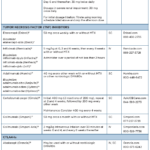NEW YORK (Reuters Health)—Adverse drug events (ADEs) are more common when drugs are used off label, especially when the off-label use lacks strong scientific evidence, researchers from Canada report.
“Our study demonstrated that physicians need to be cautious in prescribing off-label when there is a lack of strong scientific evidence for the use of the drug for a particular treatment indication,” Dr. Tewodros Eguale from McGill University, Montreal, Quebec, told Reuters Health by email. “As a result, physicians have to educate themselves or be equipped with computerized decision support systems to identify drugs and their approved and off-label indications and the scientific evidence associated with off-label uses.”
Off-label prescribing is common and, despite concerns that such prescribing contributes to preventable ADEs, there has been no systematic investigation of the effect of real-life off-label use on adverse events.
Dr. Eguale’s team used electronic health record data from Quebec to evaluate the association between off-label drug use and ADEs from January 2005–December 2010.
Almost 12% of prescriptions (17,847/151,305; 11.8%) were for off-label use, and 80.9% of these were for uses that lacked strong scientific evidence, according to the Nov. 2 JAMA Internal Medicine online report.
The overall incidence of ADEs was much higher for off-label than for on-label drug use (19.7 vs. 12.5 per 10,000 person-months).
For off-label drugs, the ADE rate was higher when the indication lacked strong scientific evidence than when there was strong scientific evidence supporting their use (21.7 vs. 13.2 per 10,000 person-months).
“Off-label uses with strong scientific evidence had the same risk of adverse drug events as on-label uses,” Dr. Eguale said.
ADE rates were highest for anti-infectives, followed by gastrointestinal tract drugs, central nervous system drugs, and cardiovascular drugs.
Other variables associated with higher ADE rates included use of more drugs, older age, female sex, and the presence of comorbidities.
“Not all off-label uses are bad, and drug prescribing depends on the context of the patient and the available drugs,” Dr. Eguale said. “Physicians should be active participants in the documentation of treatment indications and treatment outcomes. This, in the short term, will facilitate patient care and coordination of care between physicians and pharmacists, and it may also increase patients’ medication adherence.”
“In the long run, the documentation of treatment indications and treatment outcomes may help to replace the way physicians report adverse drug reactions to drug regulatory bodies,” Dr. Eguale said. “If treatment outcomes such as adverse drug reactions are documented in electronic health records, the need to ‘report’ in spontaneous reporting of adverse drug reaction will effectively be replaced with systematic documentation of adverse drug reactions and other outcomes.”
Dr. Chester B. Good, from the University of Pittsburgh in Penn., coauthored an invited commentary related to this report. He told Reuters Health by email, “I think this study is quite remarkable. Most surprising was the finding that off-label use was so infrequently supported by strong evidence, and that in those situations, patients were more likely to experience an adverse drug event significant enough to warrant discontinuation of that medication.”
“Physicians should be cautious when prescribing medications off-label,” Dr. Good said. “This is particularly important when off-label use is not supported by robust clinical evidence, or when not recommended by clinical practice guidelines. In situations where physicians prescribe medications off-label, perhaps based on theoretical reasons or personal experience only, it is prudent to inform the patient.”
“I am not suggesting that physicians prescribe medications limited to the labeled indications,” he explained. “Many off-label uses of drugs are appropriate, and indeed, are in the best interest of the patient. However, I am concerned that the FDA (Food and Drug Administration) is being challenged on their restrictions on off-label drug promotion. I am opposed to relaxing restrictions on pharmaceutical promotion beyond the labeled indications.”
“This study was made possible by documentation of the indication for prescribed medications,” Dr. Good added. “Many physicians do not include the reason for taking medications as part of their prescription, and in some situations this can lead to patient confusion and/or lower levels of compliance. Health care systems with electronic prescribing should facilitate documentation of indications by providing drop-down menus with common indications, and free-text options.”
Dr. Steven R. Feldman, from Wake Forest University School of Medicine, Winston-Salem, North Carolina, has studied off-label use of dermatological drugs. He told Reuters Health by email, “It is critically important to keep in mind that the patients were not randomized to get on-label vs. off-label treatment. It is likely that if there were a straightforward, on-label best treatment for patients, they often would have received it, and that off-label use was done because it seemed best at the time because other options had either been tried or were unavailable. Despite the enormous potential that patients who received off-label use could be at higher risk for a bad outcome, the ADE outcomes for both groups were remarkably low.”
“A relative risk of about 1.4, which was seen in this study, may sound like a lot, but because the baseline risk is so low, the real risk of an ADE with off-label use is so small as to not being worth worrying or doing anything about, especially when the result comes from a non-randomized trial that cannot account for risk differences in the populations between treated with on-label vs. off-label treatment,” Dr. Feldman said.
He concluded, “The idea of trying to regulate off-label drug use based on these data seems misguided. If anything, these data support leaving doctors alone and letting doctors continue to make decisions in the best interest in their patients.”
Dr. Joshua M. Sharfstein, from Johns Hopkins Bloomberg School of Public Health, Baltimore, told Reuters Health by email, “The major issue with off-label use is that the FDA has not made a determination as to the balance of risks and benefits.”
The authors reported no funding or disclosures. The two commenters reported advising (unpaid) the FDA.


